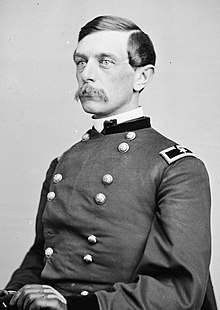James D. Fessenden
| James Deering Fessenden | |
|---|---|

James D. Fessenden
|
|
| Born |
September 28, 1833 Westbrook, Maine |
| Died | November 18, 1882 (aged 49) Portland, Maine |
| Place of burial | Evergreen Cemetery, Portland, Maine |
| Allegiance |
United States of America Union |
| Service/branch |
United States Army Union Army |
| Years of service | 1861–1866 |
| Rank |
|
| Commands held | brigade in the XIX Corps |
| Battles/wars | |
| Relations | Francis Fessenden (brother) |
James Deering Fessenden (September 28, 1833 – November 18, 1882) was a lawyer, politician, and soldier from the state of Maine who served as a general in the Union Army during the American Civil War. Primarily a staff officer and operations planner until the latter stages of the war, he commanded an infantry brigade in the Western Theater in 1864 and 1865. In 1862, he organized in South Carolina what became one of the first black regiments in the Federal army. He was a member of the powerful Fessenden family, which was prominent in national politics during the mid-19th century.
James D. Fessenden was born in Westbrook, Maine, in the early autumn of 1833. He was the son of U.S. Senator William P. Fessenden and a brother of Francis Fessenden, who would also serve as a general in the Union army. Another brother, Samuel, would be killed at the Second Battle of Manassas during the war. Two uncles, Samuel C. Fessenden and T. A. D. Fessenden were U.S. Congressmen.
He was educated in the local schools and then graduated from Bowdoin College in 1852. He studied law, passed his bar exam, and joined his father's law firm.
After the outbreak of the Civil War in early 1861, Fessenden spent the summer recruiting and organizing a company of skilled riflemen and marksmen that became a company in the United States Sharpshooters. In November of that year, he received a commission as a captain in the sharpshooter company and served in the defenses of Washington, D.C. Through the influences of his powerful father, he received a promotion to lieutenant colonel and a new position as a staff officer and aide-de-camp to Union Maj. Gen. David Hunter. He held that position from March 1862 until January 1863, serving primarily in the Department of the South and the X Corps. During that period, he was promoted to colonel in July 1862. He was involved in planning the Union operations against the Confederate defenses of Charleston, South Carolina, but missed participating in the major attacks while recovering in Washington, D.C., from a riding accident suffered in the field. During his recuperation, he frequently used his oratory and organizational skills to recruit new volunteers for military service.
...
Wikipedia
